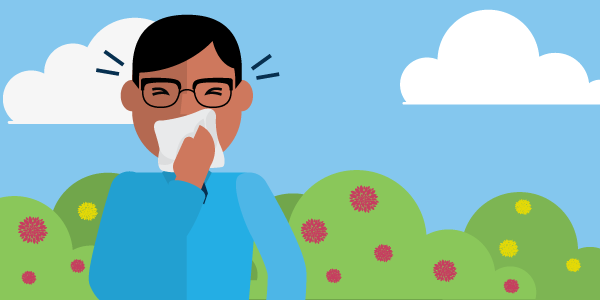Usually arriving in April when flowering plants bloom, allergy season this year has come to Sonoma State University with an early ferocity. “This allergy season has been undoubtedly the worst since I’ve been attending Sonoma State,” said Xavier Martin, a senior biology major. He is one of many affected by the sudden appearance of allergens in the region’s air. Each morning, Martin takes a non-drowsy antihistamine. “I might have one sneezing attack [after the medication,]” Martin said. “It’s better than about 10 a day.”
Dr. Joseph Lin, a professor of biology at Sonoma State who specializes in immune system research, said allergies are a result of a human’s complex immune system, which causes it to sometimes misidentify pollen or other allergens as something malicious, and thus reacts accordingly. Toni Boracchia, a nurse in the university clinic and advisor to the Student Health Advisory Committee, said allergy symptoms can happen year round, and students unfamiliar with Northern California’s plant pollens can possibly suffer allergic symptoms for the first time in their life. She mentions that the Student Health Center is currently busy with many students suffering from flu-like symptoms.
However, there has also been an increase in temperatures this February. Professor Jose Javier Hernandez Ayala, director of the Center for Climate Research in Sonoma State, said this is part of a larger national trend of increased temperatures and unusual weather patterns. According to him, records were set last week across the bay, with temperatures reaching into the high 70s. He also cited research by Charles W. Schmidt that concluded that with warmer temperatures in winter, caused by more carbon dioxide in the air, it is possible for plants to grow and pollinate more. According to a study presented in 2012 by Dr. Leonard Bielory, member of the American Academy of Allergy, Asthma, and Immunology, these environmental factors among others are likely to double the pollen count by the year 2040.
Heidi Herrmann, a lecturer at Sonoma State specializing in native plants, said the temperature increase prompted an early bloom in plants. Caitlin Hachmyer, a lecturer and expert in agroecology, said a heat wave in February is not unusual, but combined with low rainfall, it is forcing her to make decisions concerning water distribution and weather to grow warm or cold weather plants.
To avoid allergens, Boracchia recommended frequent hand washing, six to eight hours of sleep, eating and drinking regularly and bathing and washing clothes and pillow sheets. If you are experiencing symptoms and wish to see a doctor for this or any other reason, she said to call and make an appointment at 707-664-2921, starting at 8 a.m. with last appointments at 4:30 p.m., Monday through Friday.



































